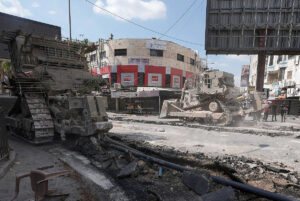Inside the brutal siege of Jenin

Israeli military forces seen during an operation in the West Bank city of Jenin, 2 September 2024
Mariam Barghouti reports in +972 on 4 September 2024:
On August 28, Israel launched “Operation Summer Camps,” the largest military invasion witnessed in the northern West Bank in over two decades. In Jenin, Israeli forces first moved into the city before imposing a full-blown siege on the refugee camp within hours; the army simultaneously carried out operations in Tubas, Nablus, Ramallah, and Tulkarem.
Since 2021, the Israeli military has repeatedly targeted Jenin refugee camp under the pretext of fighting armed resistance groups. Most of the victims of these assaults have been non-combatant Palestinian civilians and minors, according to the UN Office for the Coordination of Humanitarian Affairs (OCHA).
Local Palestinian residents and journalists say that this current assault is the most intense and violent in years, with at least 19 Palestinians killed in Jenin, including minors. This comes amid a dramatic increase in Israeli military operations and settler violence across the West Bank after October 7, which have killed nearly 700 Palestinians in the territory — 185 in Jenin alone — in brutal ways.
The army was also recently reported to have shot 83-year-old Tawfiq Qandeel in the Jenin camp on Sept. 30 [sic, presume 30 August] leaving him on the street to die without access to medical attention. A video circulated on social media two days later showing Israeli military vehicles driving over Qandeel’s body.
Bombs, bulldozers, bullets
While the Israeli army claims to be fighting the Jenin Brigades and other Palestinian resistance movements, the current operation has devastated large swathes of civilian infrastructure in the refugee camp as a clear form of collective punishment.
“They blew up our home, they blew it up!” 72-year-old Khayriyeh Khrayneh told +972, just moments after she was forced to flee her home near the eastern quarter of Jenin refugee camp.
Four days into the operation, the city had largely become a ghost town while the camp became a battlefield. Palestinians were forced to remain inside their homes as Israeli soldiers turned buildings into military bases and dispatched snipers across various rooftops. Civilians, including children, elderly, and chronically ill, have been denied access to water, food, and medicine as part of the total siege on the camp.
“We were not even allowed a glass of water,” Khrayneh cried, as they remained trapped between bombs, bulldozers, and live bullets. Khrayneh and her young daughter barely escaped their home at gunpoint, carrying nothing but a small black purse with her ID cards and passports.
